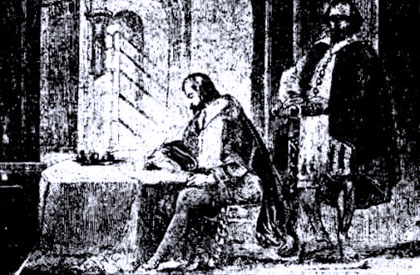
[ABOVE—Rutherford in prison, from J. C. McFeeters’ Sketches of the Covenanters, 1913.]
If we remember John Locke for his treatises on government, all the more should we remember Samuel Rutherford who preceded him. His Lex Rex developed a theory of limited, constitutional government, based on laws, not men, with separation of powers. It probably influenced Locke. Because of this book, he was charged with treason. His answer when governmental authorities summoned him to appear on the charge has become a classic quotation: “Tell them I have a summons already before a superior Judge and judicatory, and I behove [ie: find it necessary and fitting] to answer my first summons, and ere your day come I will be where few kings and great folks come.” As he predicted, he died before he could be tried. Thus he escaped the fate of other Scottish Covenanters, who were executed by hanging or in other ways.
In the 17th-century Scottish Covenanters covenanted with God for the good of their people. They fought long and hard for the crown right and prerogatives of Christ over His Church, against the claims of the Kings of England to head the church, with devastating results to themselves.
A Presbyterian serving in Galloway, Rutherford had criticized cruel Archbishop Laud of the Church of England. This and his political theory, which directly attacked the so-called “divine right of kings,” kept him in continual hot water. He spent many years banished to Aberdeen during the reign of Charles I, and several months under house arrest during the Restoration. These stints of imprisonment robbed his church people of a loving, affectionate and learned pastor. However, he communicated with them in powerful letters which continually pointed them to Christ. Charles Spurgeon, the great Baptist preacher, said of these letters, “When we are dead and gone let the world know that Spurgeon held Rutherford’s Letters to be the nearest thing to inspiration which can be found in all the writings of mere men.”
Rutherford was an active man, always doing good. He wrote many books and helped prepare the Westminster Shorter Catechism. Yet his life was involved in much suffering. In addition to the persecution and banishment he endured, he mourned the loss all but one of his seven children, who died before him. His beloved wife also preceded him in death, after a long and painful illness.
Letter LXXX [80] from The Letters of Samuel Rutherford
FOR MARION MACKNAUGHT.
My Dearly-beloved Sister, grace, mercy, and peace be to you. I complain that Galloway is not kind to me on paper; I have received no letters these sixteen weeks, but two.
I am well. My prison is a palace to me, and Christ’s banqueting-house. My Lord Jesus is as kind as they call Him. Oh, that all Scotland knew my case, and had part of my feast! I charge you, in the name of God, I charge you to believe. Fear not the sons of men, the worms shall eat them. To pray and believe now, when Christ seemeth to give you a nay-say, is more than it was before. Die believing, die with Christ’s promise in your hand.
I desire, I request, I charge your husband, and that town to stand for the truth of the Gospel. Contend with Christ’s enemies: and I pray you to show all professors [i.e.: those who falsely claim to be Christian] that you know my case. Help me to praise. The ministers here envy me; they will have my prison changed. My mother has borne me a man of contention, and one who strives with the whole earth.
Remember my love to your husband. Grace be with you.
Yours, in the Lord, S. Ru.
Aberdeen, Jan. 3, 1637.

